Carl Bildt facts for kids
Quick facts for kids
Carl Bildt
|
|
|---|---|
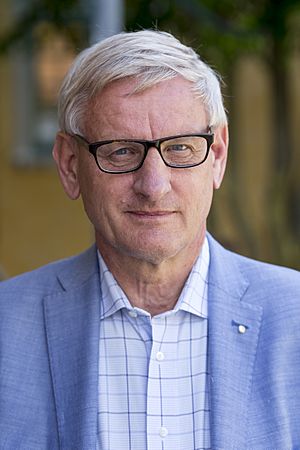
Bildt in 2016
|
|
| Prime Minister of Sweden | |
| In office 4 October 1991 – 7 October 1994 |
|
| Monarch | Carl XVI Gustaf |
| Deputy | Bengt Westerberg |
| Preceded by | Ingvar Carlsson |
| Succeeded by | Ingvar Carlsson |
| Minister for Foreign Affairs | |
| In office 6 October 2006 – 3 October 2014 |
|
| Prime Minister | Fredrik Reinfeldt |
| Preceded by | Jan Eliasson |
| Succeeded by | Margot Wallström |
| High Representative for Bosnia and Herzegovina | |
| In office 14 December 1995 – 17 June 1997 |
|
| Preceded by | Office established |
| Succeeded by | Carlos Westendorp |
| Leader of the Opposition | |
| In office 23 August 1986 – 4 October 1991 |
|
| Monarch | Carl XVI Gustaf |
| Prime Minister | Ingvar Carlsson |
| Preceded by | Ulf Adelsohn |
| Succeeded by | Ingvar Carlsson |
| In office 7 October 1994 – 4 September 1999 |
|
| Monarch | Carl XVI Gustaf |
| Prime Minister | Ingvar Carlsson Göran Persson |
| Preceded by | Ingvar Carlsson |
| Succeeded by | Bo Lundgren |
| Leader of the Moderate Party | |
| In office 23 August 1986 – 4 September 1999 |
|
| Preceded by | Ulf Adelsohn |
| Succeeded by | Bo Lundgren |
| Member of the Riksdag for Stockholm Municipality |
|
| In office 1979–2001 |
|
| Personal details | |
| Born |
Nils Daniel Carl Bildt
15 July 1949 Halmstad, Sweden |
| Political party | Moderate |
| Spouses |
Kerstin Zetterberg
(m. 1974; div. 1975)Mia Bohman
(m. 1984; div. 1997)Anna Maria Corazza
(m. 1998) |
| Children | 3 |
| Relatives | Gillis Bildt (great-great grandfather) Bildt family |
| Alma mater | Stockholm University |
| Cabinet | Bildt's Cabinet |
| Signature | |
| Military service | |
| Allegiance | |
| Branch/service | |
Nils Daniel Carl Bildt (born 15 July 1949) is a Swedish politician and diplomat. He served as the Prime Minister of Sweden from 1991 to 1994. He also led the Moderate Party from 1986 to 1999. Later, he became the Minister for Foreign Affairs from 2006 to 2014.
Carl Bildt first joined the Riksdag (Sweden's parliament) in 1979. He stayed there until 2001. He is part of the Bildt family, and his great-great-grandfather, Gillis Bildt, was also a Prime Minister of Sweden. Bildt is also known for his work as a mediator during the Yugoslav wars. He helped with peace efforts in the Former Yugoslavia and Bosnia and Herzegovina.
Contents
Early Life and Education
Carl Bildt was born on 15 July 1949 in Halmstad, Sweden. His family, the Bildt family, has a long history in Sweden. His great-great-grandfather, Gillis Bildt, was a politician and diplomat. He served as Prime Minister of Sweden from 1888 to 1889.
Carl's father, Daniel Bildt, was a major in the army reserves. Carl has a brother named Nils, born in 1952. Carl Bildt has been married three times and has three children. He studied at Stockholm University.
Early Political Career
In 1968, Carl Bildt helped start a student group called "Borgerliga Studenter – Opposition '68". This group won student elections in Stockholm. In the early 1970s, he led a student organization for center-right students. He also chaired a group called European Democrat Students.
When a non-socialist government was formed in 1976, Bildt worked in the Ministry of Economic Affairs. He became a Member of Parliament in 1979. In the early 1980s, he became known for his strong debates on foreign affairs. He was elected leader of the Moderate Party in 1986.
In the 1991 election, the Social Democrats lost to a four-party group led by Bildt's Moderate Party.
Serving as Prime Minister
On 4 October 1991, Carl Bildt became the first conservative prime minister in Sweden in 61 years. He led a government made of four different parties. His government wanted to give Sweden a "new start" during a tough economic time. They focused on selling state-owned companies and making rules simpler for businesses.
Bildt strongly believed in Sweden joining the European Union (EU). The previous government had already applied for EU membership. Bildt worked quickly to finish the talks for Sweden to join. He signed the agreement to join the EU on 23 June 1994.
A vote in November supported joining the EU. Sweden officially became a full member on 1 January 1995. This was a big goal for Bildt's government.
His government lost its majority in the September 1994 elections. However, his Moderate party gained a few more votes.
The government's economic plan focused on making the economy stronger. They introduced voucher schools and made markets for phones and energy more open. They also sold some public companies and healthcare services. These changes helped make the Swedish economy more open.
These reforms were debated a lot at the time. The government also faced rising unemployment and public debt in 1991 and 1992. Sweden had a serious economic crisis during this period. In November 1992, Sweden had to let its currency, the Swedish crown, float freely. By 1994, the economy was growing well, and debt was going down.
Before becoming prime minister, Bildt was very against the Soviet Union. He supported the three Baltic nations. As prime minister, he worked hard to help these new countries. He helped them with issues like the withdrawal of former Soviet forces.
His government also had to manage many refugees, mainly from the war in Bosnia. Bildt supported a welcoming approach to immigrants.
Bildt was an early supporter of the Internet. In 1994, he led the first IT Commission in Sweden. He also had the first email exchange between two heads of government with US President Bill Clinton. He sent Clinton an email about ending the trade embargo on Vietnam.
The government sometimes had disagreements. One big debate was about building the Øresund Bridge. This led to one party leader leaving the government. Bildt continued to lead the Moderate party until 1999.
Work in the Balkans
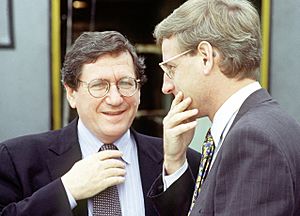
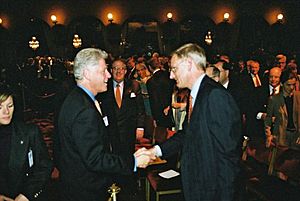
After being prime minister, Bildt worked as a mediator in the Balkans conflict. He was the European Union's Special Envoy to Former Yugoslavia from June 1995. He also helped lead the Dayton Peace Conference in November 1995. This conference led to the Dayton Peace Accords.
From December 1995 to June 1997, he was the High Representative for Bosnia and Herzegovina. This was right after the Bosnian War. From 1999 to 2001, he was the United Nations Secretary-General's Special Envoy for the Balkans.
Kosovo declared its independence from Serbia in 2008. Sweden recognized Kosovo's independence in March 2008. Bildt was the first foreign minister to visit Kosovo after it declared independence.
Minister for Foreign Affairs
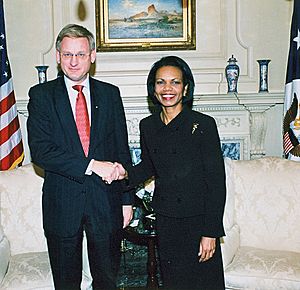
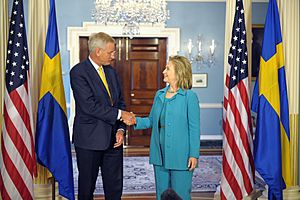
On 6 October 2006, Bildt became the Minister of Foreign Affairs. This was part of the new government led by Fredrik Reinfeldt. Many people were surprised by this, as Bildt had already been prime minister. He kept this job after the 2010 election.
During his time as Foreign Minister, Bildt helped create the EU's Eastern Partnership in 2008. When Sweden led the presidency of the Council of the European Union in 2009, he chaired important EU meetings. He was often considered a candidate for a top EU foreign policy job.
Bildt supported the 2011 military intervention in Libya. In March 2011, the government sent JAS 39 Gripen fighter jets to Libya. Their job was to help enforce a no-fly zone.
After the 2014 European elections, Bildt was again seen as a possible candidate for a top EU foreign policy role. However, someone else got the position.
Bildt left his post after the 2014 general election. He then joined the board of the International Crisis Group.
Views on Turkey
As Foreign Minister in 2007, Bildt actively supported Turkey joining the EU. He called Istanbul a "true center of European history." He also called Kemal Atatürk a very important European revolutionary. Bildt's support for Turkey's EU membership was debated in central Europe.
Turkey's EU membership faced challenges because its government did not recognize Cyprus, an EU member. Also, the President of France, Nicolas Sarkozy, had concerns.
Views on South Ossetian Conflict
After the 2008 South Ossetia war, Bildt wrote on his blog about Russia's reasons for its actions. He said Russia's concern for its citizens in nearby countries was similar to past events. Bildt called South Ossetian independence "a joke."
Internet Activities
Bildt was one of the first politicians to use the Internet for communication. In 1994, he sent an email to US president Bill Clinton. This was the first known email between two heads of government. He also started a weekly email newsletter that ran until 2005.
He is an active blogger, starting his first blog in 2005. His current blog, started in 2007, is very popular in Sweden.
In 2007, Bildt opened a "Swedish embassy" in the virtual world Second Life. This virtual embassy was a copy of the real Swedish embassy in Washington, D.C. During his time as Foreign Minister, his ministry also started a YouTube channel. He also uses Twitter to share his thoughts. By 2013, a survey showed him as one of the most connected world leaders online.
Life After Politics
From 2014 to 2016, Bildt chaired the Global Commission on Internet Governance. This group worked on important issues about the internet. In 2015, he was appointed to Ukraine's International Advisory Council on Reforms. This group advises the Ukrainian President on security and economy.
Bildt also joined the board of directors for the investment group LetterOne. In 2016, he became a Senior Policy Advisor at the law firm Covington. He also writes monthly articles for an international organization called Project Syndicate.
After the 2022 Swedish general election, the new Prime Minister, Ulf Kristersson, offered Bildt the role of Foreign Minister again. Bildt declined, saying he prefers not to do the same job twice.
Non-profit Organizations
Carl Bildt is involved with many non-profit groups. These include:
- Center for European Policy Analysis (CEPA)
- Global Leadership Foundation
- Historians without Borders
- Atlantic Council
- Berggruen Institute
- Centre for European Reform (CER)
- Club de Madrid
- European Council on Foreign Relations (ECFR)
- Friends of Europe
- GLOBSEC
- International Crisis Group (ICG)
- International Institute for Strategic Studies (IISS)
- Middle East Investment Initiative (MEII)
- Munich Security Conference (MSC)
- RAND Corporation
- Stockholm Resilience Centre (SRC)
- Trilateral Commission
- Wallenberg Foundations
- Wilfried Martens Centre for European Studies
- Yalta European Strategy (YES)
Awards and Honors
Carl Bildt has received many awards and honors for his work. These include:

 H. M. The King's Medal (2003)
H. M. The King's Medal (2003)
 Legion of Honour, Commander
Legion of Honour, Commander
 Order of St Michael and St George, Honorary Knight Commander
Order of St Michael and St George, Honorary Knight Commander
 Order of Merit of the Federal Republic of Germany, Grand Cross
Order of Merit of the Federal Republic of Germany, Grand Cross
 Order of the Oak Crown, Grand Cross
Order of the Oak Crown, Grand Cross
 Order of the Phoenix, Grand Cross
Order of the Phoenix, Grand Cross
 Order of Merit, Grand Cross
Order of Merit, Grand Cross
 Order of Merit, Grand Cross
Order of Merit, Grand Cross
 Order of Grand Duke Gediminas, Grand Cross
Order of Grand Duke Gediminas, Grand Cross
 Order of the Three Stars, Commander Grand Cross
Order of the Three Stars, Commander Grand Cross
 Order of the Cross of Terra Mariana, Grand Cross
Order of the Cross of Terra Mariana, Grand Cross
 Royal Order of Merit, Grand Cross (1 July 1992)
Royal Order of Merit, Grand Cross (1 July 1992)
 Order of Prince Yaroslav the Wise, Second Class
Order of Prince Yaroslav the Wise, Second Class- He has an honorary doctorate from the University of St Andrews.
- He is an honorary member of the Institute for Information on the Crimes of Communism.
- He received the Knight of Freedom Award in 2015.
See also
 In Spanish: Carl Bildt para niños
In Spanish: Carl Bildt para niños
 | James Van Der Zee |
 | Alma Thomas |
 | Ellis Wilson |
 | Margaret Taylor-Burroughs |

